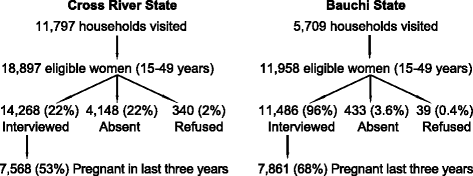Seeking evidence to support efforts to increase use of antenatal care: a cross-sectional study in two states of Nigeria
- PMID: 25410003
- PMCID: PMC4245780
- DOI: 10.1186/s12884-014-0380-4
Seeking evidence to support efforts to increase use of antenatal care: a cross-sectional study in two states of Nigeria
Abstract
Background: Antenatal care (ANC) attendance is a strong predictor of maternal outcomes. In Nigeria, government health planners at state level and below have limited access to population-based estimates of ANC coverage and factors associated with its use. A mixed methods study examined factors associated with the use of government ANC services in two states of Nigeria, and shared the findings with stakeholders.
Methods: A quantitative household survey in Bauchi and Cross River states of Nigeria collected data from women aged 15-49 years on ANC use during their last completed pregnancy and potentially associated factors including socio-economic conditions, exposure to domestic violence and local availability of services. Bivariate and multivariate analysis examined associations with having at least four government ANC visits. We collected qualitative data from 180 focus groups of women who discussed the survey findings and recommended solutions. We shared the findings with state, Local Government Authority, and community stakeholders to support evidence-based planning.
Results: 40% of 7870 women in Bauchi and 46% of 7759 in Cross River had at least four government ANC visits. Women's education, urban residence, information from heath workers, help from family members, and household owning motorized transport were associated with ANC use in both states. Additional factors for women in Cross River included age above 18 years, being married or cohabiting, being less poor (having enough food during the last week), not experiencing intimate partner violence during the last year, and education of the household head. Factors for women in Bauchi were presence of government ANC services within their community and more than two previous pregnancies. Focus groups cited costly, poor quality, and inaccessible government services, and uncooperative partners as reasons for not attending ANC. Government and other stakeholders planned evidence-based interventions to increase ANC uptake.
Conclusion: Use of ANC services remains low in both states. The factors related to use of ANC services are consistent with those reported previously. Efforts to increase uptake of ANC should focus particularly on poor and uneducated women. Local solutions generated by discussion of the evidence with stakeholders could be more effective and sustainable than externally driven interventions.
Similar articles
-
Do empowered women receive better quality antenatal care in Pakistan? An analysis of demographic and health survey data.PLoS One. 2022 Jan 6;17(1):e0262323. doi: 10.1371/journal.pone.0262323. eCollection 2022. PLoS One. 2022. PMID: 34990479 Free PMC article.
-
Sub-national analysis and determinants of numbers of antenatal care contacts in Nigeria: assessing the compliance with the WHO recommended standard guidelines.BMC Pregnancy Childbirth. 2021 May 25;21(1):402. doi: 10.1186/s12884-021-03837-y. BMC Pregnancy Childbirth. 2021. PMID: 34034680 Free PMC article.
-
Understanding whose births get registered: a cross sectional study in Bauchi and Cross River states, Nigeria.BMC Res Notes. 2015 Mar 13;8:79. doi: 10.1186/s13104-015-1026-y. BMC Res Notes. 2015. PMID: 25879591 Free PMC article.
-
Factors influencing the uptake of antenatal care in Uganda: a mixed methods systematic review.BMC Pregnancy Childbirth. 2024 Nov 8;24(1):730. doi: 10.1186/s12884-024-06938-6. BMC Pregnancy Childbirth. 2024. PMID: 39516857 Free PMC article.
-
Evolution and determinants of antenatal care services utilization among women of reproductive age in Rwanda: a scoping review.BMC Health Serv Res. 2024 Dec 21;24(1):1636. doi: 10.1186/s12913-024-12038-0. BMC Health Serv Res. 2024. PMID: 39709445 Free PMC article.
Cited by
-
The Equity Impact of Universal Home Visits to Pregnant Women and Their Spouses in Bauchi State, Nigeria: Secondary Analysis From a Cluster Randomised Controlled Trial.Community Health Equity Res Policy. 2025 Jan;45(2):141-151. doi: 10.1177/2752535X241249893. Epub 2024 Apr 27. Community Health Equity Res Policy. 2025. PMID: 38676402 Free PMC article. Clinical Trial.
-
Intimate partner violence and its association with skilled birth attendance among women in Nigeria: evidence from the Nigeria Demographic and Health Surveys.BMC Pregnancy Childbirth. 2022 Aug 30;22(1):667. doi: 10.1186/s12884-022-04989-1. BMC Pregnancy Childbirth. 2022. PMID: 36042396 Free PMC article.
-
Detecting and managing hypertensive disorders in pregnancy: a cross-sectional analysis of the quality of antenatal care in Nigeria.BMC Health Serv Res. 2019 Jun 24;19(1):411. doi: 10.1186/s12913-019-4217-8. BMC Health Serv Res. 2019. PMID: 31234838 Free PMC article.
-
Inequities in the use of sulphadoxine-pyrimethamine for malaria prophylaxis during pregnancy in Nigeria.Malawi Med J. 2020 Mar;32(1):45-51. doi: 10.4314/mmj.v32i1.9. Malawi Med J. 2020. PMID: 32733659 Free PMC article.
-
Traditional medicine used in childbirth and for childhood diarrhoea in Nigeria's Cross River State: interviews with traditional practitioners and a statewide cross-sectional study.BMJ Open. 2016 Apr 19;6(4):e010417. doi: 10.1136/bmjopen-2015-010417. BMJ Open. 2016. PMID: 27094939 Free PMC article.
References
-
- World Health Organisation & UNICEF . Antenatal Care in Developing Countries: Promises, Achievements and Missed Opportunities: An Analysis of Trends, Levels and Differentials 1990–2001. Geneva & New York: WHO & UNICEF; 2003.
Publication types
MeSH terms
LinkOut - more resources
Full Text Sources
Other Literature Sources
Medical


